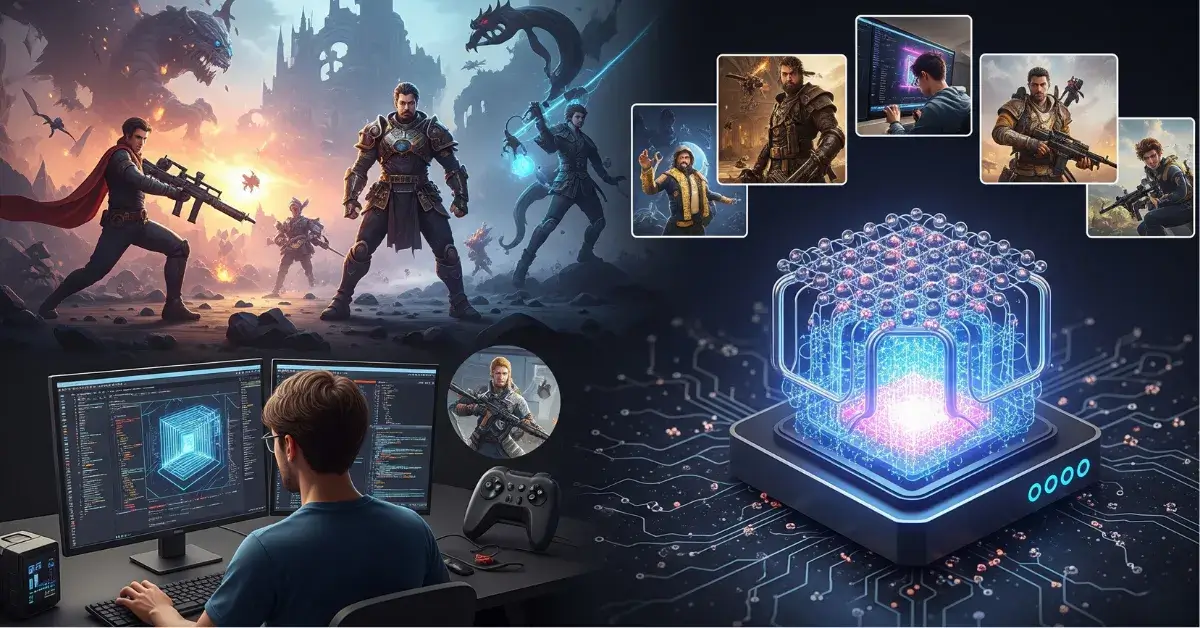Technology has been playing a crucial role in the evolution of game development. Technology has enabled immersive experiences and complex gameplay by utilizing tools like artificial intelligence and game engines. Game developers utilize software tools, such as game engines, to create video games, enabling interactive entertainment.
Quantum computing has emerged as a frontier promising to transform the way games are developed. Quantum technology will ensure efficiency and speed when solving complex problems in game development. Early adopters in gaming are continuing with their research on leveraging quantum computing. The early adopters aim to push the boundaries of AI capabilities and computational efficiency.
With its ability to handle vast amounts of data and simulate complex systems, quantum computing introduces a new way of thinking about what games can become. From intelligent NPCs to dynamically generated worlds, its possibilities stretch far beyond today’s capabilities. As the gaming industry continues to innovate, quantum technology may very well become the foundation for next-generation interactive experiences.
What is Quantum Computing?

Quantum computing is an emerging technology that leverages the principles of quantum mechanics to solve complex problems. Quantum computing utilizes qubits, which exist in a multidimensional state, unlike classical computers that use bits. The more qubits a quantum computer has, the more powerful it is. Beyond gaming, quantum computing is applied in many fields.
Quantum Computing Applications in Multiple Sectors

Healthcare and pharmaceuticals
Quantum computing is helping researchers understand how molecules behave at a deeper level. This allows scientists to design and test new drugs faster and more accurately. It can also improve how diseases are diagnosed and treated by simulating complex biological systems that traditional computers struggle to model in real time.
- Drug discovery: Quantum computers aid in understanding how drug compounds interact with biological systems. This knowledge can be used to design effective drugs more efficiently.
- Generic research: Quantum computing help in discovering new drugs by modelling their properties and interactions before they are synthesized in the lab.
Finance
Financial modelling: Quantum computing is utilized for targeting and prediction, trading optimization, and risk profiling.
In the financial world, every millisecond counts — and that’s where quantum computing could make a huge difference. By analyzing countless market variables at once, quantum systems can help detect patterns and risks that traditional models might miss. Banks and investment firms are exploring how quantum algorithms can improve portfolio management and simulate economic scenarios more accurately.
Cybersecurity
Data protection: Quantum computing relies on quantum mechanics to securely distribute cryptographic keys.
Quantum technology introduces a new level of security through quantum key distribution (QKD), which makes it nearly impossible for attackers to intercept or alter sensitive data without being detected. This method could play a vital role in protecting online transactions, personal information, and game server communications.
As cyber threats grow more advanced, quantum encryption is being seen as a potential game-changer for industries that require strong data integrity. In the gaming world, where privacy and secure multiplayer environments are essential, this could set the foundation for safer online experiences. Generally, quantum computing is helping solve cybersecurity challenges that once seemed too complex for traditional systems.
How Quantum Computing Could Impact Game Development
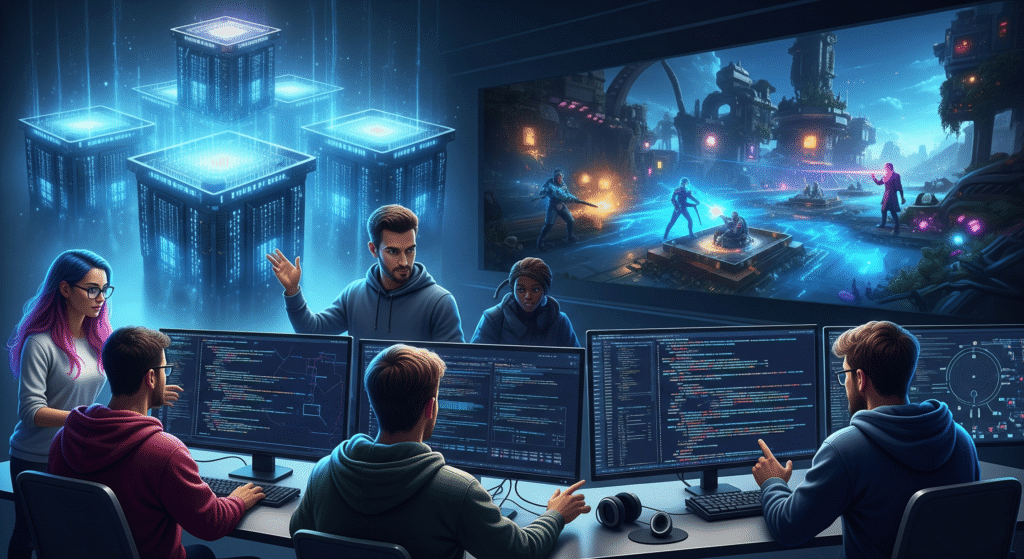
Procedural Generation
Quantum computing could help enhance procedural content generation by enabling the creation of complex, unpredictable, and highly detailed game worlds through the use of optimized algorithms.
This will allow developers to generate unique landscapes and environments at an unprecedented scale. Unlike in today’s procedural generation, quantum computing could help create unique landscapes and ecosystems every time a player starts a game.
AI and Machine Learning
Quantum computing can help transform AI and machine learning in gaming by enabling efficient processing of complex algorithms. Quantum computing can help to enhance Non-Playable Characters (NPCs), player interactions, and game realism by:
- NPCs with advanced decision-making abilities
Unlike traditional NPCs that use classical AI to react to player actions, quantum-powered AI could help analyze multiple decision paths concurrently. This allows the NPCs to make more intelligent and unpredictable choices based on in-game conditions.
- AI that learns and adapts dynamically to player behaviour
Machine learning in games in the current world depends on classical AI models that require high computing power. Quantum AI can help analyze large amounts of player data instantly, making it easier to recognize and respond to player tendencies.
Realistic Physics Simulations
Quantum computing could enable more efficient and accurate fluid dynamics, destruction physics, and collision detection, resulting in lifelike animations and environments.
For example, in an open-world racing game, quantum simulations could calculate real-time water splashes, tire skids, and weather interactions far more accurately than current methods. In action or shooter games, explosions might react differently based on real-time material properties — like walls crumbling with realistic weight and direction, or fire spreading dynamically across surfaces. In puzzle or sandbox games, fluid movement (like lava, water, or slime) could be simulated with ultra-fine detail, reacting to player movement in new and surprising ways.
Massive Parallel Processing
Quantum computers process a vast number of computations concurrently, which could help reduce rendering times, enhance game optimization, and enable real-time interactions.
This means that tasks which usually take minutes or even hours on traditional systems — like rendering massive game worlds or simulating complex character behavior — could be completed much faster. For example, in large-scale multiplayer games, quantum systems could help handle thousands of simultaneous player actions without lag. In cinematic cutscenes or VR environments, it could allow smoother frame transitions and more responsive animations, even under heavy graphical loads.
Early Adopters & Quantum Gaming Experiments

Although the full adoption of quantum computing has not yet been implemented, some companies and research groups have already begun utilizing it in gaming for predictive modelling and complex simulations. IBM, Google, and Microsoft facilitate the integration of quantum computing with game development.
Norma & Neowiz Collaboration
Norma, a South Korean developer, has signed a Memorandum of Understanding with Neowiz, an AI research firm, to explore quantum AI models and quantum security for gaming. Their collaboration aims to develop AI-driven gameplay while ensuring security for online games.
Moth’s Initiative: Quantum-Powered Procedural Art
The Moth initiative is introducing the integration of quantum computing to develop quantum-powered procedural art tools for game developers, aiming to unlock new creative possibilities.
IBM & D-Wave Quantum Labs
These are the leaders in the field of quantum computing. IBM and D-Wave are conducting research in quantum-driven simulations in gaming. They are focusing on quantum algorithms that can help to improve world-building and complex game logic.
Game Companies Exploring Quantum Computing
Despite quantum computing not yet being fully implemented, several game companies are testing quantum-based encryption for securing online games, quantum-enhanced pathfinding for navigation, and enhanced physics simulation. Well-known companies specializing in quantum computing include IBM, Microsoft, Google, and Amazon.
Some studios are also partnering with quantum research labs to experiment with small-scale simulations and procedural content generation tools. These collaborations are helping developers better understand how quantum algorithms might fit into future game engines.
While we’re still in the early phases, the interest shows that gaming companies want to be prepared for what’s coming next. As quantum hardware becomes more accessible, we can expect more developers to get involved in testing real-world use cases. The goal is not just faster games — but smarter, more dynamic, and deeply immersive experiences.
Challenges & Limitations of Quantum Computing in Gaming
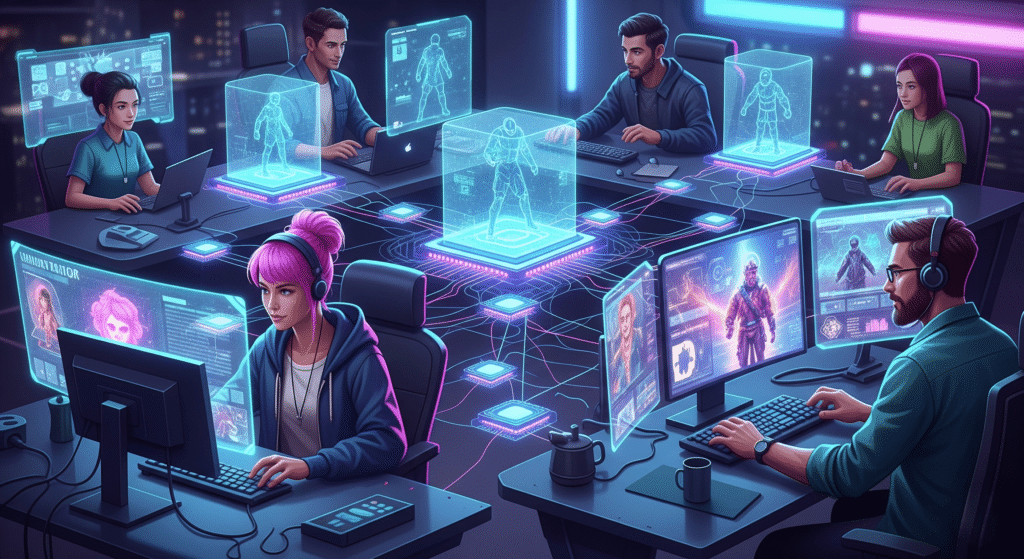
Quantum computing has become a significant development in the current computing landscape. Quantum computing has impacted various sectors, including communication, education, healthcare, and many others. Despite all these advantages, it also faces several challenges.
Hardware limitations
Computers required in quantum computing require complex environments with extremely low temperatures and specialized conditions. Maintaining these conditions is currently costly and impractical for commercial gaming studios.
Algorithm Development
Game development requires the creation of new algorithms specifically designed for quantum computing. Quantum developers must learn quantum programming languages to develop the required algorithms.
Scalability Issues
The gaming activities involve huge numbers of calculations per second to perform physics simulations, AI behaviors, and graphics rendering. Current quantum computers lack the necessary processing power to handle these massive workloads in real-time. It is also a challenge to integrate quantum with the other classical systems. This includes the need to redesign the entire game architecture.
Uncertain Timeline
It has been predicted that it may take 10 to 15 years for quantum computing to be used for mainstream gaming. Before it gets fully adopted, developers need to rely on hybrid approaches.Quantum computers are currently expensive and impractical for real-time gaming. This has been one of the reasons why quantum computing is yet to be fully implemented.
The Future of Quantum Computing in Games
Quantum computing is still in its early stages. Only a few companies and research groups have implemented it so far.
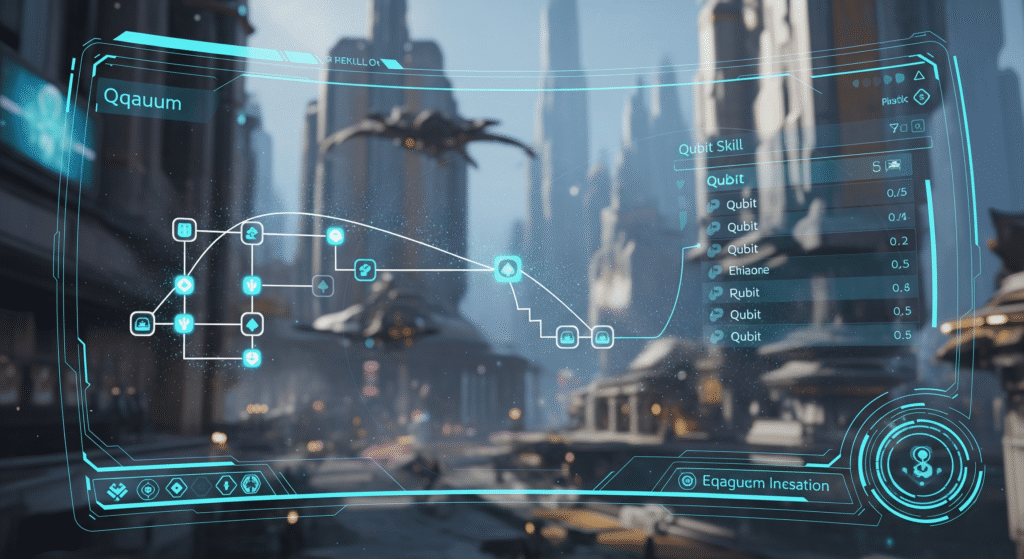
Long Term Potential
As the implementation of quantum computing continues, there will likely be opportunities for a fully dynamic game world where physics behaves unpredictably and players experience different, evolving narratives.
Hybrid Approaches
Current quantum computers are too fragile and expensive. At present, game developers need to integrate classical and quantum computing. They will utilize quantum computing for tasks such as physics modelling, while leveraging traditional systems for rendering and real-time interactions.
Tech Giants Leading the Way
Giants in technology, such as IBM, Microsoft, and Google, have invested heavily in quantum research, ensuring that the gaming industry will benefit from these improvements in the future.
Quick Summary
- Quantum computing enhances AI, physics, and procedural generation in gaming.
- Early adopters like IBM, Microsoft, and Neowiz are leading research and prototyping.
- Mainstream use is still years away, but hybrid quantum-classical approaches are emerging.
- Game developers should stay updated as the industry explores this cutting-edge frontier.
Research Papers & Academic Resources
Explore some key academic work that highlights how quantum computing is beginning to influence the gaming world:
- Quantum Game Jam – Making Games with Quantum Physicists (arXiv, 2024)
A study on collaborative game jams between developers and quantum scientists, resulting in dozens of quantum-themed game prototypes. - Defining Quantum Games (EPJ Quantum Technology, 2022)
Provides a detailed taxonomy of quantum games, classifying early experiments and laying the groundwork for future quantum-interactive systems. - Quantum Games and Interactive Tools for Quantum Technologies Outreach (arXiv, 2022)
Focuses on educational and outreach-based quantum games like Hello Quantum and QPlayLearn - Qubit: The Game – Teaching Quantum Computing Through a Game-Based Approach (ICCS, 2023)
Showcases a game-based learning model for introducing quantum principles to students and the general public.
Industry & Community Highlights
Real-world examples and industry involvement from early adopters pushing the boundary of quantum-powered game experiences:
- IBM Nordic – Quantum Gaming is Here: Learnings from the Quantum Game Jam
A firsthand report of how IBM supported quantum game development through a game jam event in Finland, combining quantum SDKs with real-time procedural design. - Quantum Sheikh’s Review of 300+ Quantum Games
A broad study that categorizes hundreds of quantum-influenced games, including prototypes, narrative experiences, and puzzle platforms. - The Marriage of Quantum Computing and Interactive Storytelling (ResearchGate, 2021)
Documents how quantum mechanics is being used to shape nonlinear, choice-driven storytelling in experimental games.
Conclusion
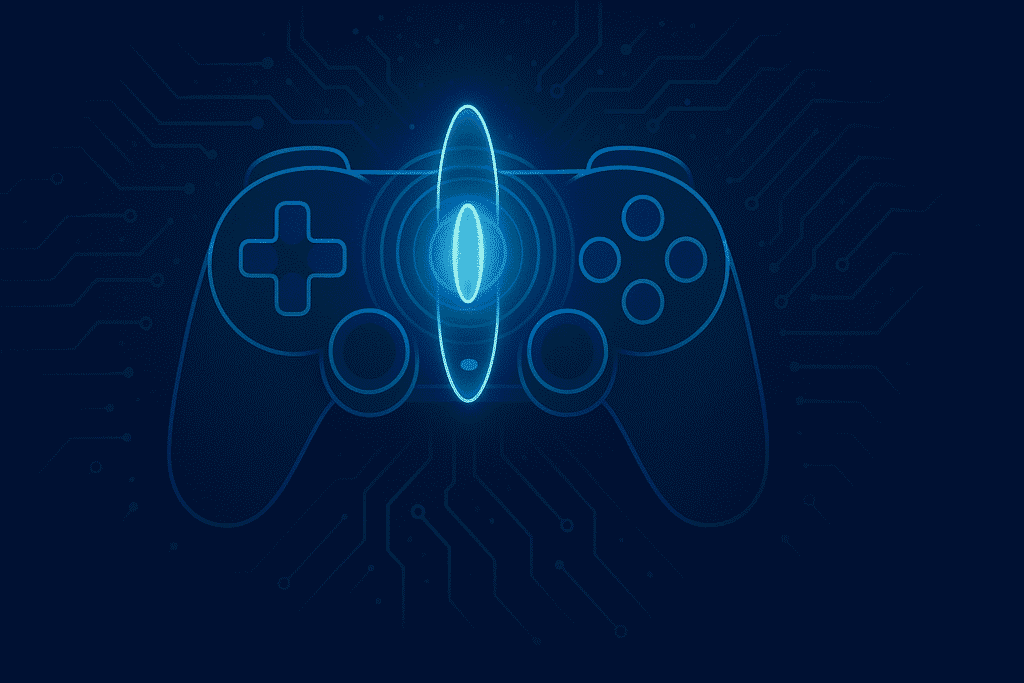
Quantum computing is still in its infancy stages, but its potential in AI, procedural generation, physics simulations, and security could redefine the gaming industry. Although it may take some time to fully adopt the use of quantum computing, early adopters have already begun utilizing it.
Game developers and others inspired by technology should stay updated on quantum gaming experiments, as these experiments aim to transform interactive entertainment.
As research progresses and hybrid models emerge, the gap between concept and reality will continue to shrink. The coming years may not bring fully quantum-powered games, but they will lay the foundation for breakthroughs we once thought impossible. Staying informed today could give developers a serious edge tomorrow — in both creativity and innovation.
More 2025 Gaming Tech Insights 🢃
GeForce Now vs xCloud vs PS Plus Premium: Best Cloud Gaming Compared in 2025
Machine Learning in Games: Best Procedural Tech for 2025
Neural Rendering in Games: The Future of Graphics Beyond Ray Tracing (2025)
Cloud Gaming’s Future: Will “INDIA” be Emerging in 2025?
Connect with GamesNerdz for more latest Gaming news and tips!!!

